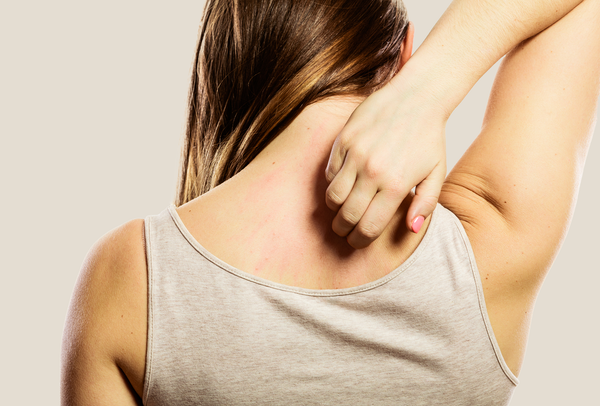Hormones affect our entire body, and their influence is especially noticeable during times of fluctuation—such as puberty, pregnancy, and menopause. Hot flashes and sleep disruption are often the most talked-about symptoms when the balance of hormones like estrogen, testosterone, and progesterone changes during perimenopause and after menopause itself. In addition, the hair and skin can experience significant changes as well.
What is menopause?
It’s important to understand that menopause officially begins once you haven’t had your period for one full year. However, the perimenopausal phase that precedes menopause can begin as early as the late 30s, although the average age is 40 to 44. During perimenopause, estrogen levels become unpredictable, and are likely to go up and down. Perimenopausal women in their late 40s and early 50s often begin missing periods, and estrogen levels drop significantly about six months before periods stop and menopause occurs.[1]
The effects of menopause on the hair
Estrogen plays a role in hair growth by prolonging the anagen (or growth) phase, which is why many women find their hair is thicker and grows faster during pregnancy. As estrogen levels drop when women approach menopause, research has shown that the number of hairs in the active growth phase decreases.[2] As a result, many women say they notice a difference in their hair’s appearance before and during menopause. The most common complaints are shedding and thinning. Ironically, the hormonal shifts associated with menopause may prompt the growth of hair where you might prefer not to have it, such as on the upper lip and chin.
How menopause can affect the skin
Estrogen is a skin-friendly hormone that helps maintain plumpness, elasticity, and hydration. Less estrogen translates to the loss of collagen, which can lead to skin thinning, sagging, and wrinkles.[3] Menopause and the natural aging process can also decrease the skin’s oil production and impair skin barrier function[4], which compromises the skin’s ability to hold on to moisture. This is why many menopausal women report experiencing dry skin that may be accompanied by itching and increased sensitivity.
Acne flare-ups around menopause can be another unexpected surprise. At this stage of life, breakouts can be due to a shift in the balance between estrogen and testosterone. Less estrogen production can tip the hormonal scale in favor of testosterone, which is responsible for the oil production that can clog pores. However, stress, diet, and other lifestyle factors can also play a role.[5]
How SEEN can help menopausal hair and skin
Although SEEN can’t address the hormonal changes that contribute to the hair and skin changes that may be associated with menopause, our products can help optimize hair and skin health to minimize these specific issues associated with hormonal fluctuations.
Scalp health: The follicles within the scalp are responsible for healthy hair growth, so supporting their work should be a priority at every stage of life and especially around menopause. Harvard-trained dermatologist Dr. Iris Rubin created SEEN to offer gentle yet effective haircare products that respect scalp health. SEEN is free of sulfates that can be drying to the scalp (as well as the hair and skin), and most of our products are formulated with bisabolol for its skin-calming benefits. SEEN’s Restore Scalp Serum promotes a healthy scalp environment that supports the hair follicles by providing the hydration that’s essential for a skin-barrier function and balancing the microbiome. In fact, 100% of users say their scalp feels healthier after just two weeks.*
Skin health: Caring for menopausal skin starts with gentle cleansing. SEEN’s sulfate-free Face Wash and Body Wash effectively cleanse the skin of excess oil, dirt, and debris without disrupting the skin barrier, making them ideal for dry skin, safe for sensitive skin that can occur during menopause, and appropriate for skin of all types and ages for that matter.
Non-comedogenic products: Anyone with skin that is prone to breakouts should know haircare (and skincare) that contain potentially pore-clogging ingredients can contribute to acne. That’s why all SEEN products are non-comedogenic—which means you can rest assured they won’t cause clogged pores. In fact, a SEEN regimen of Face Wash, Body Wash, Shampoo, Conditioner, and styling products can help promote skin clarity.
SEEN wants women at all stages of life to love their hair as well as the skin they’re in without having to make compromises in terms of results. If you are experiencing menopause-related changes that impact your quality of life, it’s essential to talk to your doctor. Hormonal changes can be just one cause, so it’s important to monitor your thyroid and overall health as well when navigating menopause.
*In a consumer perception study, 30 participants with mild-moderate dry, flaky scalp used SEEN Restore Scalp Serum for 2 weeks.
[1] https://www.mountsinai.org/health-library/report/menopause#:~:text=There%20are%20two%20stages%20in,women%20ages%2040%20to%2044.
[2] https://www.ncbi.nlm.nih.gov/pmc/articles/PMC10092469/
[3] https://www.ncbi.nlm.nih.gov/pmc/articles/PMC3772914/
[4] https://www.nm.org/healthbeat/healthy-tips/menopause-and-your-skin
[5] ttps://www.ncbi.nlm.nih.gov/pmc/articles/PMC6825478/




